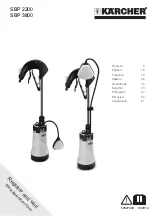
4
Specific Safety Rules
•
Disconnect power before using tool near live wires or where there may be
hidden wiring.
Cutting accessory contacting a “live” wire may make exposed metal
parts of the power tool “live” and could give the operator an electric shock.” Always
check for hidden wiring, gas lines, or other utilities before performing any material
cutting or removal operations with the tool.
•
Hold power tool by insulated gripping surfaces, when performing an operation
where the cutting accessory may contact hidden wiring.
Cutting accessory
contacting a "live" wire may make exposed metal parts of the power tool "live"
and
could give the operator an electric shock.
•
Use clamps or another practical way to secure and support the workpiece to a
stable platform.
Holding the work by hand or against your body leaves it unstable
and may lead to loss of control.
•
Wait for the cutter to stop before setting the tool down
.
An exposed cutter may
engage the surface leading to possible loss of control and serious injury.
• Do not operate this tool for long periods of time.
Vibration caused by the operating
action of this tool may cause permanent injury to fingers, hands, and arms. Use gloves
to provide extra cushion, take frequent rest periods, and limit daily time of use.
• Always hold the tool firmly with both hands for maximum control.
Keep proper
footing and balance at all times. This enables better control of the power tool in
unexpected situations.
• Do not restart the cutting operation in the workpiece.
Let the tool reach full
speed and carefully re-enter the cut.
• Do not “jam” the cut-off saw blade or apply excessive pressure.
Do not attempt
to make an excessive depth of cut.
• Keep your hands away from cutting area.
Do not reach under the material being
cut.
• Do not use dull or damaged blades.
Bent blade can break easily or cause
kickback. Exercise extreme caution when handling the accessories. The accessories
are very sharp. Wear protective gloves when changing cutting accessories.
Accessories become hot after prolonged usage.
• Before scraping, check workpiece for nails.
If there are nails, either remove them
or set them well below intended finished surface. Striking a nail with accessory edge
could cause the tool to jump.
• Do not wet sand with this tool.
Liquids entering the motor housing are an
electrical shock hazard.
• Never work in area which is soaked with a liquid, such as a solvent or water,
or dampened such as newly applied wallpaper.
There is an electrical shock
hazard when working in such conditions with a power tool and heating of the liquid
caused by scraping action may cause harmful vapors to be emitted from workpiece.
• Do not use sandpaper intended for larger sanding pads.
Larger sandpaper will
extend beyond the sanding pad causing snagging, tearing of the paper or kick-back.
Extra paper extending beyond the sanding pad can also cause serious lacerations.
WARNING:
ALWAYS
use safety glasses. Everyday eyeglasses are NOT safety
glasses. Also use face or dust mask. ALWAYS WEAR CERTIFIED SAFETY EQUIPMENT:
•
ANSI Z87.1 eye protection (CAN/CPA Z94.3),
•
ANSI S12.6 (S3.19) hearing protection,
•
NOSH/OSHA respiratory protection.
WARNING:
Some dust created by power sanding, sawing, grinding, drilling, and
other construction activities contains chemicals known to the state of California to cause
cancer, birth defects or other reproductive harm. Some examples of these chemicals are:
• lead from lead-based paints,
• crystalline silica from bricks and cement and other masonry products, and
• arsenic and chromium from chemically-treated lumber.
Your risk from these exposures varies, depending on how often you do this type of work.
To reduce your exposure to these chemicals: work in a well ventilated area, and work
with approved safety equipment, such as those dust masks that are specially designed to
filter out microscopic particles.





































